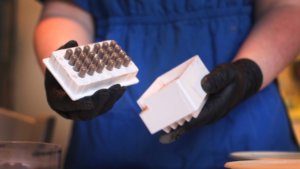
New vaccine hope for psoriasis patients
Researchers at the Universities of Dundee and Oxford in the U.K. are optimistic about a vaccine they have developed in the aim of treating chronic skin conditions such as psoriasis and cat hair allergies.
This vaccine, developed by combining elements of cucumber mosaic virus — a virus that can attack cucurbits — and a tetanus-vaccine-derived protein structure, is capable of stimulating the immune system by increasing the production of antibodies targeting the protein responsible for psoriasis.
This treatment, currently tested on mice, has been given the green light for clinical trials on humans. According to the researchers, the vaccine could replace the monthly antibody injections currently available for the most severely affected psoriasis patients, and offer a more affordable therapeutic option.
Currently available psoriasis treatments are tailored to the severity of the condition and can include orally administered drugs, as well as injections or decoctions.
When psoriasis is highly localized, covering less than 10% of the body, creams are applied locally to lesions. These contain various anti-inflammatory substances: corticosteroids (“cortisone”), keratolyitics, vitamin D derivatives, tazarotene and emollients to to soften the skin.
If this fails, patients are often prescribed immunomodulators — drugs in the form of pills or injections — and ultraviolet light therapy (PUVA therapy).
Finally, biotherapies, which have progressed greatly in recent years, include drugs based on “monoclonal antibodies,” which target a substance involved in the inflammation mechanism.
One such drug, called secukinumab, was authorized by the European Medicines Agency in January 2015, for patients with moderate to severe psoriasis and is administered by subcutaneous injection.
Two other biotherapies are ixekizumab and brodalumab. These two antibodies are likely to be available in 2017.
Authorized for the American market by the FDA, ixekizumab is a monoclonal antibody administered by monthly cutaneous injection. It is the most recent therapy developed for moderate to severe psoriasis and could soon be available elsewhere.
Note that alcohol, smoking, stress, obesity and certain drugs (nonsteroidal antiinflammatory drugs, beta blockers, etc.) can aggravate psoriasis in people with a genetic predisposition.
Psoriasis is an autoimmune condition that is unpredictable in its development. It causes skin inflammation in the form of red scaly patches and, in 30 per cent of cases, a form of inflammatory arthritis. The condition affects around 125 million people worldwide and is more often relieved by reducing visible signs and symptoms rather than being cured.
Photo credit: JodiJacobson / Istock.com
Original article at: http://www.ctvnews.ca/health/new-vaccine-hope-for-psoriasis-patients-1.3651521








